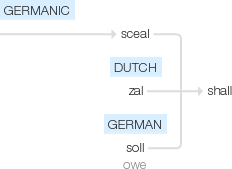Shall
Old English sceal, of Germanic origin; related to Dutch zal and German soll, from a base meaning ‘owe’.
wiktionary
From Middle English schal (infinitive schulen), from Old English sċeal (infinitive sċulan(“to be obligated or obliged to, shall, must, owe, ought to”)), from Proto-West Germanic *skulan, from Proto-Germanic *skal (infinitive *skulaną), from Proto-Indo-European *skel-(“to owe, be under obligation”).
Cognate with Scots sall, sal(“shall”), West Frisian sil (infinitive sille(“shall”)), Dutch zal (infinitive zullen(“shall”)), Low German schall (infinitive schölen(“shall”)), German soll (infinitive sollen(“ought to”)), Danish skal (infinitive skulle(“shall”)), Icelandic skal (infinitive skulu(“shall”)), Afrikaans sal. Related to shild.
etymonline
shall (v.)
Old English sceal, Northumbrian scule "I owe/he owes, will have to, ought to, must" (infinitive sculan, past tense sceolde), a common Germanic preterite-present verb (along with can, may, will), from Proto-Germanic *skal- (source also of Old Saxon sculan, Old Frisian skil, Old Norse and Swedish skola, Middle Dutch sullen, Old High German solan, German sollen, Gothic skulan "to owe, be under obligation;" related via past tense form to Old English scyld "guilt," German Schuld "guilt, debt;" also Old Norse Skuld, name of one of the Norns), from PIE root *skel- (2) "to be under an obligation."
Ground sense of the Germanic word probably is "I owe," hence "I ought." The sense shifted in Middle English from a notion of "obligation" to include "futurity." Its past tense form has become should (q.v.). Cognates outside Germanic are Lithuanian skelėti "to be guilty," skilti "to get into debt;" Old Prussian skallisnan "duty," skellants "guilty."
